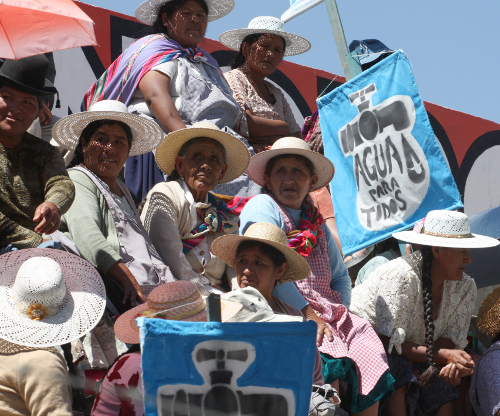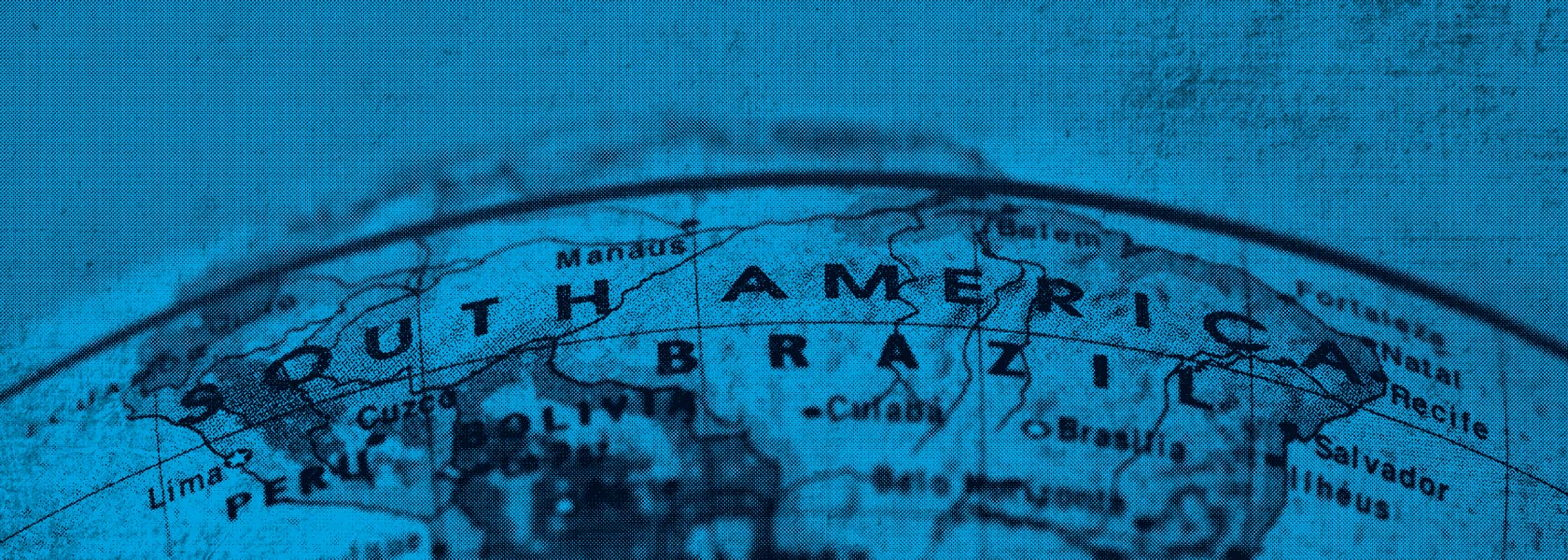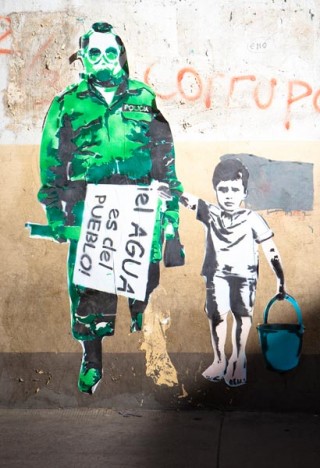Defending the Commons
Cochabamba taught us that the real issue is not the capture of state power, but the creation of new pathways from the grassroots up.
After the Water War
- Issue #
- Author
Water War mural in Cochabamba by Mona Caron. Photo: Mona Caron
In Latin America, the struggle for water as a common good is present in almost all environmental conflicts—sparked by extractive, industrial, highway and energy projects—but also forms part of the agenda of urban and labor movements rallying against privatization, shortages, sanitation problems, and so on.
This does not come as a surprise, since water—as a common good and as a human right—is an essential part of our lifeworld, of how we relate to the planet and to each other. Water to be consumed and managed by humans; water for the reproduction of life; water as a living entity that flows and evolves; water as a sacred being or territory: all the above are perceptions radically opposed to water as a commodity, to water as a “resource” or financial asset.
The Cochabamba Water War
Water privatization signifies not only the expropriation of a public good, but also the destruction of collectively managed community water systems. The consequences of this destruction extend far beyond the loss of physical property: the aim of these actions is the dissolution of people’s power that was constructed around these organizations. This was one of the underlying motives that sparked the Cochabamba Water War in Bolivia in 2000.
Following a rise of more than 200 percent in tariffs, the expropriation of the self-managed water systems and the stripping away of their powers of deliberation and decision, various social, labor, peasant and neighborhood organizations began to mobilize. After days of protest and coordination between the different organizations in struggle, the Coordinating Committee for the Defense of Water and Life (Coordinadora por la defensa del agua y la vida) was formed.
The Cochabamba Water War became a major reference point for movements in South America and around the world.
The Coordinadora was an innovative kind of organization at that time, as it broke with the logic of trade unionism (a current that is hierarchical and even authoritarian to a certain extent), to establish processes of decision-making based on direct democracy. Through councils and assemblies, the Coordinadora achieved a broad social legitimacy at all levels—even among the upper and middle classes—as it did not recognize any leaders or chiefs; it was constructed as a space with which everyone could identify.
In the end, popular resistance proved stronger than the government’s resolve, so the latter had no choice but to terminate the contracts with the multinational water company Bechtel and prepare for the return of water to public hands. This historic event became a major point of reference for many movements in South America and around the world; movements that often achieved great victories against privatization. Prominent examples include Uruguay, Italy and France.
A wave of resistance against neoliberalism
However, this is not the end of the story, as every popular revolt creates a “before” and an “after.” In the case of Cochabamba, we can say that “we won the war but we lost the water.” Despite the great efforts of the Coordinadora to create a social, self-managed and truly democratic water company, the labyrinth of bureaucracy and the state institutions did not allow this to take place.
In the case of Cochabamba, we can say that “we won the war but we lost the water.”
The Municipal Drinking Water and Sewage Service, SEMAPA, became a public company again, just as inefficient and mired in corruption as it had always been. The autonomous water systems kept control of their water sources, without any support or public funding, only maintained through self-management. However, problems of sewage treatment, water quality and planning persisted.
Nevertheless, the war was won, and with it people’s dignity and capacity to resist were reclaimed. Following the Water War, Bolivia was never the same; a wave of resistance against the neoliberal policies of dispossession spread throughout the country. Protests became an everyday phenomenon and successive governments felt the tide of popular unrest closing in on them.
A decisive year was 2003, when the Gas War broke out and social movements fought for reclaiming this resource from the hands of rapacious transnational corporations. The state was brought to its knees after a conflict that included nationwide roadblocks and hunger strikes, which left 80 protesters dead and the government in a state of collapse. In the end, President Gonzalo Sánchez de Lozada was forced to flee the country. A new era had started for Bolivia.
Several years later, Evo Morales, a cocalero leader of indigenous descent, was elected president; soon after, a Constituent Assembly was convened to refound the country. This had been one of the objectives of the Coordinadora since the very start.
Latin America’s progressive governments
In the past decade, Latin America has experienced an era of hegemonic instability, with each country experiencing its own particular processes and each local revolt marked by its own distinguishing features.

10th anniversary of the Cochabamba Water War, by Peg Hunter, via Flickr
In Bolivia and Ecuador, in particular, there was a discursive shift regarding the state and its relationship with society. These changes were the result of uninterrupted efforts of organization, resistance and mobilization of the popular classes during nearly 20 years of neoliberal imposition. It was they who made possible the emergence of “progressive” governments in their countries. In this context, the movements in defense of water achieved important legal victories, which had considerable—yet insufficient and limited—effects on society.
The continent’s progressive governments have achieved a certain economic stability through nationalizations, amendments to contracts with transnational corporations, strict control on government spending and good relationships with the financial institutions as well as the industrial and agro-industrial sectors.
On the other hand, a new political panorama has emerged, which utilizes a discourse and a set of symbols previously relegated to the periphery of the political center. Popular demands such as the recognition of indigenous rights, the nationalization of natural resources, the protection of Mother Earth, the self-determination of peoples or the promotion of buen vivir have been put on the political agenda.
Across Latin America, new imaginaries were born that challenge neoliberalism, colonialism and the cultural hegemony of the West.
At the same time, new imaginaries were born that challenge neoliberalism, colonialism and the cultural hegemony of the West—interculturalism, plurinationalism and decolonization are only a few of them. This new discursive structure has transformed the very way of doing politics.
In these contexts, new legal panoramas were created and constitutional reforms or new constitutions came into effect. These new legal frameworks expanded rights and freedoms while protecting national economies and establishing welfare measures, benefits, and so on. This was made possible by reinstating public control of strategic enterprises like oil, mining, electricity, telecommunications and water.
Change the world by taking power?
But despite these changes at the political and economic level, a product of years of social struggles and popular organization, it has not yet been possible to create—and much less implement—alternatives to the capitalist world-system. Indeed, the most radical governments of South America keep implementing policies that favor the hegemonic political powers and go against the interests of the population.
But what are the limitations of the transformations that arise from the heart of the political center—in other words, from the state?
Here are some threads of analysis:
- Systematic violation of the new social agreements established after the accession of the progressive governments. Plain and simple, governments are very skilled at taking away with one hand what they give with the other.
- The move from private plunder to public plunder. In Bolivia, for example, the constitution recognizes water as a public good, stipulating its protection as an obligation of the state. As a result, laws that seek to expropriate the independent self-managed water systems are elaborated. In other words, there is a risk of reducing the ability of people to self-manage their needs.
- The institutional framework does not allow for transformative change. Despite all the progress that we may have experienced on issues related to water, especially in reclaiming water as a “public” good, there is a gap between the expectations of the social movements and reality.
Practical changes that stem from an emancipatory perspective from below have crashed against an institutional framework inherited from neoliberalism, which aims to obstruct, confound and reorient social transformation. The pace of change of the institutions is a far cry from the pace of the people in struggle.

Movements “in” or “against” power?
Some of the problems encountered by “democratic revolutions” such as those of Ecuador and Bolivia include the absence of a “legal framework” to implement social change, the outright and systematic violation of laws, and legislation that is slow to be approved, that remains stagnant or that is negotiated behind society’s back.
A perverted and callous state bureaucracy has aided in the generalization of a sense of frustration: expectations, which run too high according to some, always end up clashing with reality. In effect, institutional processes and their agents (deputies, senators, government officials) tend once more to replace the people in decision-making. All administrations end up, sooner or later, adopting this logic—with varying degrees of benefits for the population—and looking for ways to better connect with the global marketplace.
The problems, failures and shortcomings of the progressive governments should serve as a history lesson in our quest for constructing “other possible worlds.”
In fact, in Bolivia, social movements that at first directly influenced government policies have been largely co-opted and converted into mouthpieces of the official discourse, that is, mere instruments of legitimation of public policies which, it should be noted, are not necessarily beneficial to the population. In addition, social groups that rejected playing a part in this clientelist and corporatist relationship have now fallen prey to constant political harassment and intimidation.
At this point we have to point out that the problems, failures and shortcomings of the progressive governments should serve as a history lesson in our quest for constructing “other possible worlds.” The problems and contradictions do not only derive from bad decisions or betrayal of the revolutionary aims; rather, they are related to the very nature of the state apparatus as such.
In that sense, it is important to reflect on whether social movements can be “in power” or just “against power.”
Unfortunately, it is a fact that—just as nature does not permit places without life (we find microorganisms even in the harshest climates)—politics does not permit political power vacuums. For instance, when the 15-M movement in Spain called for electoral abstention in Spain, it unwillingly contributed to the accession of Rajoy’s proto-fascist right to power. We would be better off following what the Guarani people have proposed: “I prefer to choose my enemy.”
At the same time, we should stress the importance of self-management, of social control, of the creation of strategies that point towards the “social re-appropriation of what is public.”
The limits of neo-extractivism
In general, the discourse of South America’s “left-wing” governments regarding the protection of Pachamama (Mother Earth) is in crisis, since they have not been able to implement initiatives that could explore alternative paths to the current situation, at least not in the short or medium term.
Development, and the related doctrine of neo-extractivism, represent for the moment the only path to follow. Under this scenario, attacks on Pachamama and indigenous peoples are justified as a sacrifice “for the benefit of the majority,” or even as a basis for achieving a “good life.”

Photo by Kris Krüg, via Flickr
On the other hand, a renewed “national consciousness,” promoted through state discourse in these countries, becomes an instrument for the legitimation of neo-extractivism, with the state taking a central role in its management, eventually creating new forms of wealth redistribution. Social programs, such as subsidies and benefits supported by the extractive activity, thus become a mechanism for reducing poverty and legitimating the state.
In short, the social-ecological consequences of this economic model are recognized, however, the belief that this is just a transitory stage until the consolidation of better living conditions prevails. This inevitably generates questions about the extent to which we can consider this model of development as a step towards better ways of life when it forms the basis of new institutional and social structures, in addition to a new relationship between state and society.
Neo-extractivism may be a feast today, yet bring famine and bondage tomorrow.
Lessons from Cochabamba
The Water War has provided us with valuable lessons that become even more important in the present-day reality of Latin America. Preserving the independence of movements, creating ties between them and reclaiming politics are but some of them.
The social movements that fight in defense of water and life must maintain, at all costs, their autonomy from parties and their political independence. The reason is that the real issue is not the capture of state power but the creation of new pathways from the grassroots up.
The state and the market economy exist, and they are not likely to disappear despite our best hopes and actions to the contrary; therefore, liberal democracy can run its course, electing bad rulers or better ones—this should not be a central issue in the agenda of social movements. An important issue, perhaps, but not a central one.
The social movements must maintain, at all costs, their autonomy from parties and their political independence.
Our struggle is to consolidate our autonomy, to build tight-knit relations of solidarity, friendship and constant reflection, to come together in defense against the attacks of transnational capital and the state as its accomplice, to establish new ways of living that are not mediated by capital and to defend the existing ones—such as those bequeathed to us by our indigenous grandmothers and grandfathers. The social movements organize to change the world from the bottom up.
Politics resides in action, in everyday life, not in some institution. Who has the right to decide on our present and on the fate of the population, on the commons, on work, on living conditions? There can be only one answer to this question: the common people. We decide and we do, we discuss and we act. It is not enough to simply resist. We need to exist again, to build here and now the world in which we want to live tomorrow.
Source URL — https://roarmag.org/magazine/oscar-olivera-water-war-commons/
Next Magazine article
Reopening the Revolutionary Question
- Amador Fernández-Savater
- December 9, 2015
Ending Anti-Black State Violence
- Opal Tometi
- December 9, 2015

